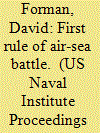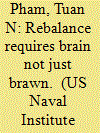| Srl | Item |
| 1 |
ID:
130060


|
|
|
|
|
| Publication |
2014.
|
| Summary/Abstract |
When it comes to the much-discussed concept, misconceptions abound; the first thing to fix may be the nomenclature itself.
If there were a first rule of Air-Sea Battle (ASB), it should be: "Do not talk about Air-Sea Battle." The cloud of confusion and criticism surrounding the concept is undermining this Department of Defense 21st-century warfare initiative. When the world's only superpower announces something called "Air-Sea Battle ," the rest of the world listens, and the DOD must get it right. Failure to correct current misunderstandings about the idea could lead to unintended and unwanted consequences counter to U.S. strategic interests. It is time for Air-Sea Battle 2.0, and step one is changing the name.
|
|
|
|
|
|
|
|
|
|
|
|
|
|
|
|
| 2 |
ID:
130059


|
|
|
|
|
| Publication |
2014.
|
| Summary/Abstract |
The U.S. Navy needs a comprehensive, cost-effective, and sustainable plan to develop and deploy more regional experts to the Asia-Pacific region.
The Navy is at the forefront of the U.S. rebalance toward the Asia-Pacific region, a fundamentally maritime domain with contested global commons. This "pivot" builds on decades of a strong regional presence and long-standing alliances and partnerships with countries in the vicinity. To be effective, however, the rebalance must incorporate "brains" in addition to "brawn." While the Navy has strengthened its presence in the Pacific by increasing its rotational force deployments, basing more ships and aircraft forward, and fielding new capabilities, its efforts to enhance its intellectual capital are still underreported, under-resourced, and too often undervalued. But this is beginning to change, due in large part to the efforts of the staff of the Office of the Chief of Naval Operations.
|
|
|
|
|
|
|
|
|
|
|
|
|
|
|
|